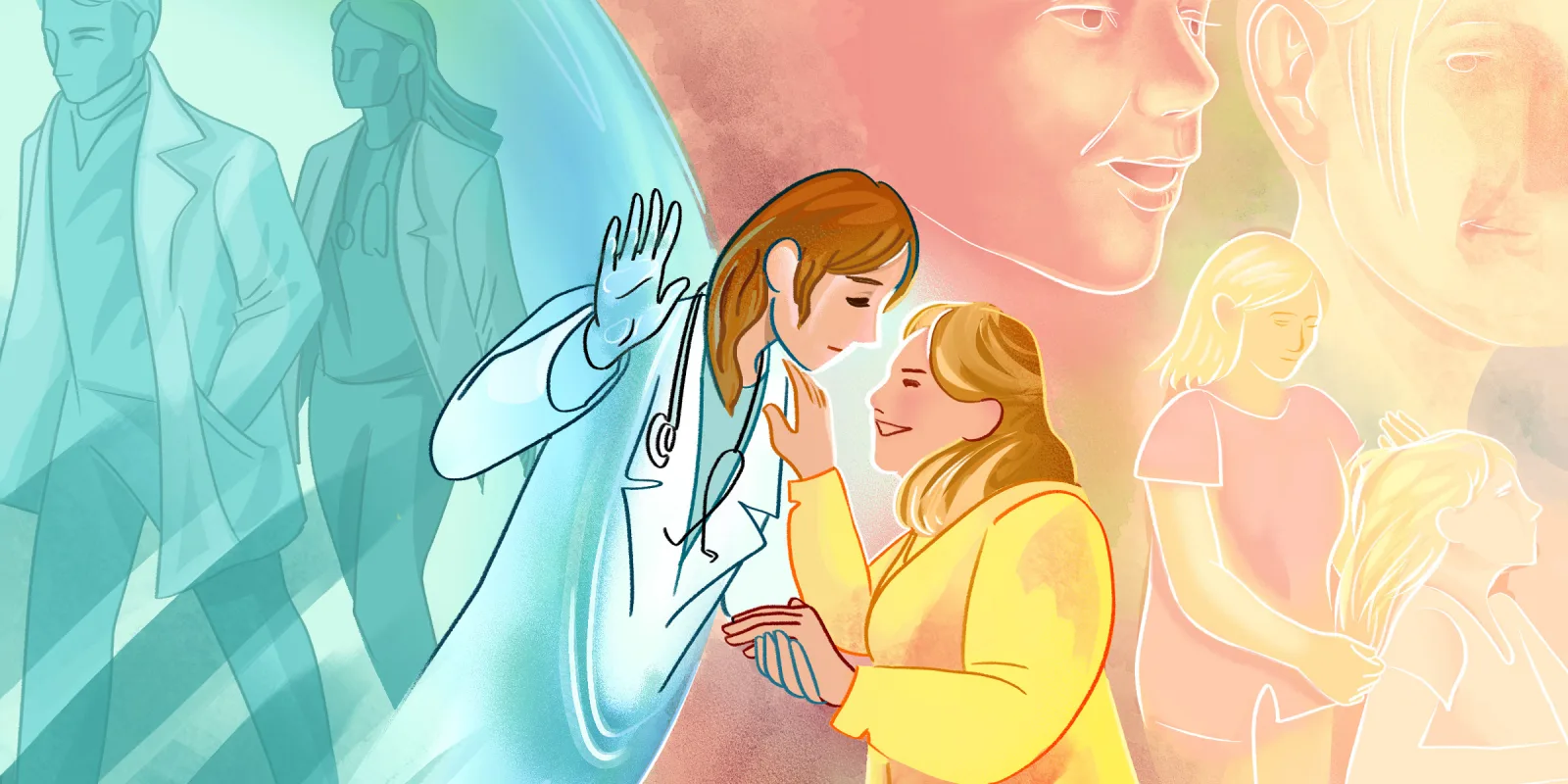The patient appeared anxious. She viewed her admission to the hospital for shortness of breath as a failure. A perfectionist by nature, she worried that the new oxygen tank she would discharge home with was a harbinger of a future in which she would be burdensome to others, unable to care for her pet, or unable to stay in the house she called home. I looked at her hands, bruised from IV insertions; her eyes, brimming with tears; and her hospital gown, neatly buttoned and tied — reminiscent of the generation from which she came, the one that precariously held it together amid a war-torn world and war’s aftermath. She shared her birth year, her fierce independence, and her anxiety with my mother. The resemblance was uncanny. I wondered, Should I treat this patient like my mother or a stranger?
A diagram from an early medical school lesson illustrating countertransference popped into the forefront of my mind. Countertransference, or the way in which a caregiver reacts to a patient, was portrayed in the form of a young physician treating an older patient, thinking to himself, He’s just like my dad. I mentally associate this image with one professor’s cautionary tale that countertransference looms over our patient interactions, a shadowy, possibly nefarious force, against which physicians must be vigilant. What confused me in medical school was that countertransference seemed like a form of compassion. Wouldn’t treating a patient — any patient — like a loved one just be good patient care?
As the days passed, I found myself unconsciously gravitating toward my anxious patient’s bedside. Her room was near the unit workroom, and I internally justified more frequent afternoon rounding checks and longer conversations about her symptoms as a way of engaging in real patient care while taking a break from sitting at my computer. Perhaps more frequent monitoring of her oxygen saturations and extra serial lung examinations might relieve her anxiety, I thought. Soon, however, I came to realize that the anxiety I was relieving was my own.
If my mother were hospitalized, I hoped someone would take time to sit with her, explain her treatment options in easily understandable language, and assertively attempt to alleviate her fear of losing her independence. I was filling this role for this patient, but as I read over the five other names on my patient roster, I came to understand the complicated crux of countertransference that my professor had warned us about. Essentially, the patients to whom we don’t relate, or who unconsciously remind us of someone with whom we have a tenuous relationship, are at risk of not getting our full attention — despite our best intentions. It is an often unspoken, and often necessary, reality of medicine that we devote slightly different amounts of time to caring for each of our patients, based on their unique needs. However, when our personal experiences — instead of medical necessity — guide our time spent with patients, this seems ethically problematic.
As I spent time with the patient above, a patient down the hallway was wondering — I came to find out the next morning on rounds — whether he should book concert tickets to a show nine months away, and if his upcoming colonoscopy was urgent. He had just received a cancer diagnosis and was processing the news, approaching each life decision with new, overwhelming uncertainty. Another patient under my care was wondering whether he should have even presented to the hospital at all — battling feelings of low self-worth, doubting that his symptoms were severe enough for him to merit a hospital bed, and thinking his medical questions were “stupid.” Months later, back on psychiatry service, I found two of my patients sitting next to each other. One patient’s acuity required that I speak with them first, perhaps leaving the other patient to wonder why they took second priority. I told — and continue to tell — my patients that they, their questions, their doubts, and their needs are important to me. Sometimes, however, I worry that my patients measure their importance by the time we spend together. If this is in fact the case, it is crucial that countertransference does not play a modifying role in triaging time spent with patients.
Unconsciously relating to a patient as if they are a loved one has pitfalls, but what about consciously relating to a patient? Within the American Psychiatric Association definition of countertransference, which refers to a therapist’s reaction to a patient (but certainly seems to apply to that of a physician), it is recommended that caregivers “must be aware of, and analyze, countertransference so that it can be used productively within the therapeutic process.” Perhaps it is not necessary to treat our patients like strangers, with all the polite distance that implies. Channeling conscious connections with patients — perhaps a shared hobby or common cultural background — can help forge connections and build rapport.
That said, it is important for physicians to be conscious of when our past experiences overlap too much with those of our patients — to the point where treating a patient feels like treating a loved one or ourselves. The old mantra “physician, heal thyself” is in direct conflict with the American Medical Association (AMA) ethics opinion that physicians should not treat themselves or their loved ones. The ethical principle of justice, as described in this AMA Journal of Ethics piece, mandates us to ensure a “fair and equitable distribution of health resources.” We are, in a sense, human resources — and no matter who a patient is, isn’t, or reminds us of, our patients deserve our highest quality of care, compassion, and medically sound decision-making.
A reality of medicine is that no matter how hard we try to avoid it, we are human. It is an insurmountable task to disentangle our past experiences, emotional reactions, and relationships from our care of patients. In some instances, our pasts can enhance our care of patients, but it is important to be conscious of which patients’ care we are enhancing, and if any patients lose out on our best, most equitable care in the process.
Have you ever experienced countertransference in the clinical setting? How did you approach it, and what lessons did you glean? Share in the comments!
Dr. Elizabeth Bruce is a former public school teacher and current PGY-1 psychiatry resident physician at the University of Michigan. Her wellness activities include running, crossword puzzles, traveling, and spending time with her spouse and shelter pets. Dr. Bruce is a 2022–2023 Doximity Op-Med Fellow.
Illustration by April Brust







